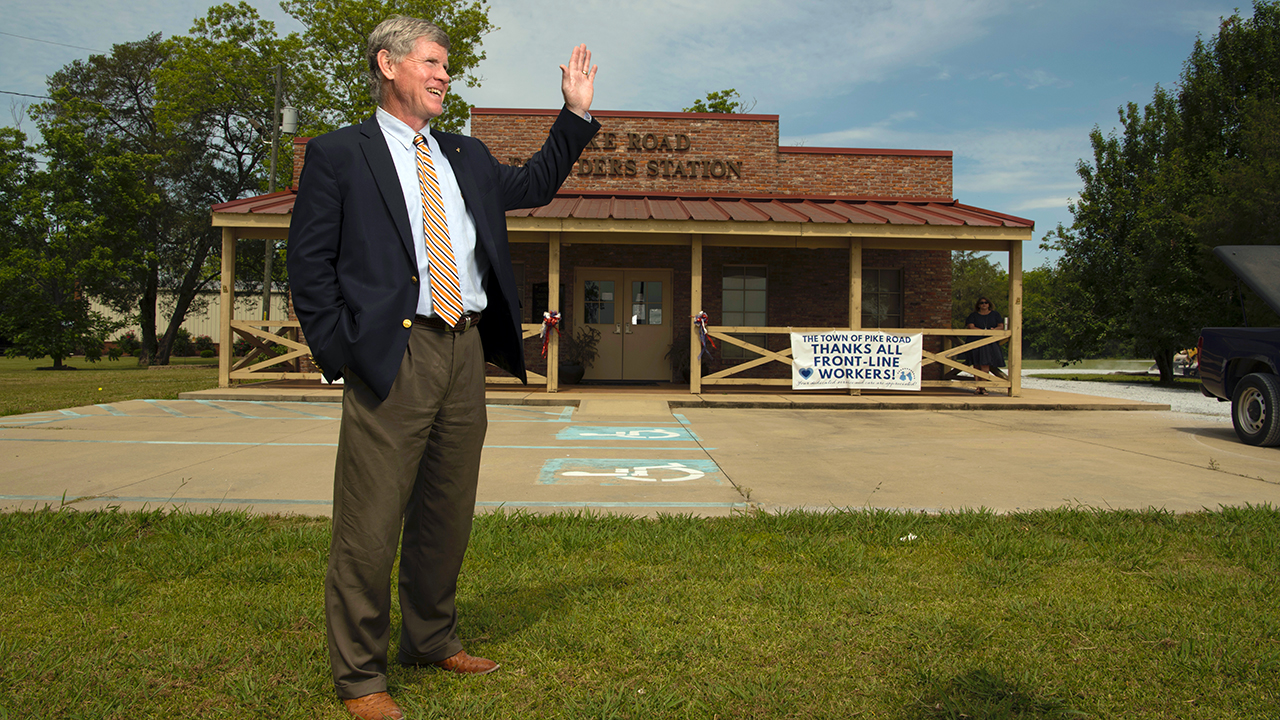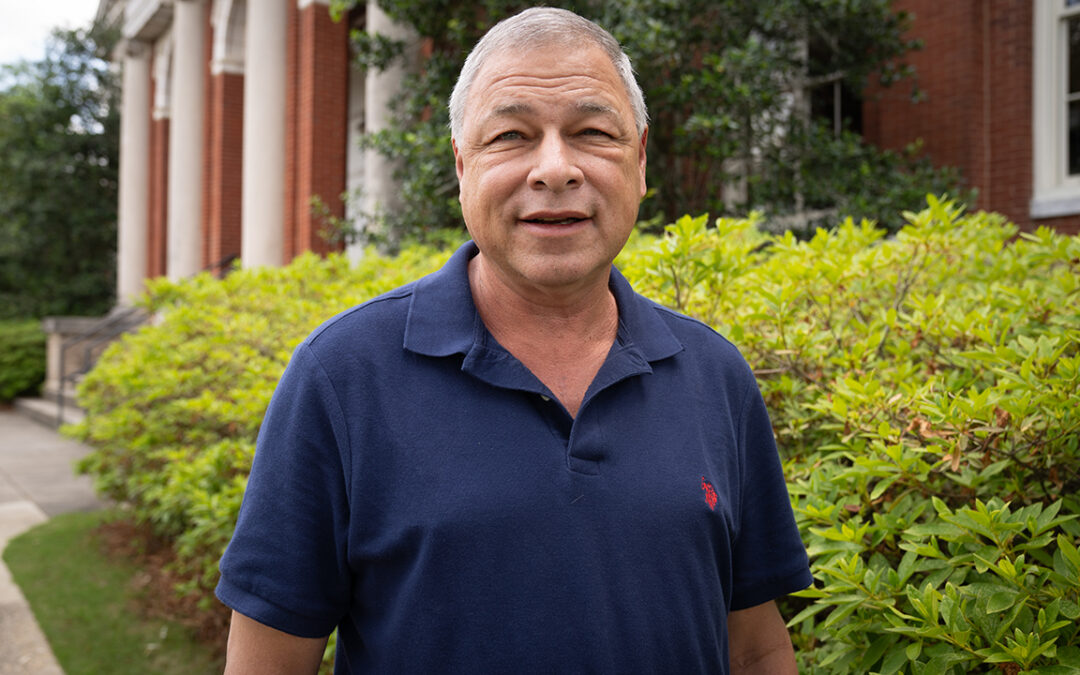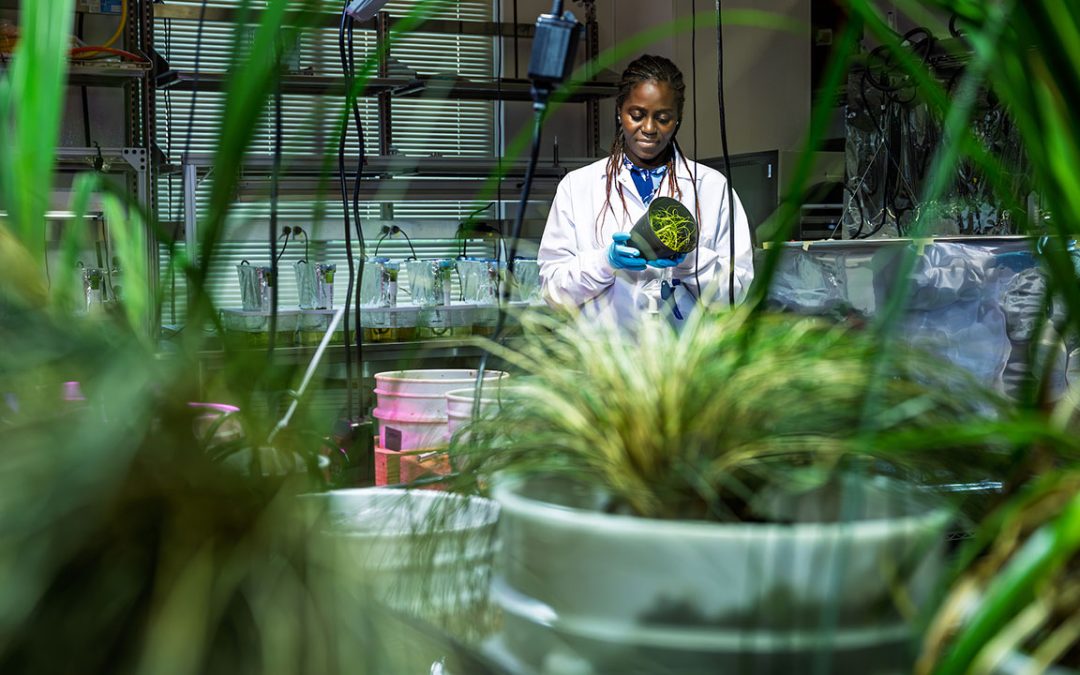By Mary Catherine Gaston / Jun 9, 2020 9:12:29 AM
Feature
1986 College of Agriculture alumnus Gordon Stone and his wife, Ellen, share how personal tragedy transformed their lives and outlook
When Gordon arrived at her office to check on her a few hours later, he found his typically upbeat, energetic wife behind her closed office door, head down on her desk. He knew right away that something was terribly wrong. The couple went immediately to the hospital, where Ellen was admitted and connected to a fetal monitor, revealing what neither had wanted to consider: Ellen was in active labor.
The medical team spent the following 24 hours doing everything they could to postpone delivery, but their efforts proved useless. On Saturday afternoon, May 8, Alvin Gordon Stone III, or Trace, entered the world on the eve of Mother’s Day.
From that moment on, Trace faced one setback after another with a tenacity that surprised no one well acquainted with his parents. But toward the end of his second week in the world, Trace’s medical team told his parents that their fragile child was suffering terribly from necrotizing enterocolitis, or NEC. Common to premature infants, the diagnosis meant that bacteria were attacking and destroying Trace’s intestinal wall, and he would not survive without surgery. Trace was transferred to a hospital in Birmingham, to the care of the only doctor in Alabama who could perform the extremely delicate procedure. Though the surgery was a success, Trace’s vital signs never quite made the climb back to where they had been.
On the 24th day of Trace Stone’s life, Gordon and Ellen received news that their child was not likely to live another 24 hours. Gordon clearly recalls his own reaction to the devastating report: He returned to the hospital room where he and Ellen were temporarily living, hit the floor with both hands and face pressed into the hard, cold tile and prayed.
“‘Lord, please heal him,’ was all I could find to say,” Gordon remembered. “You get to a point where there are no words — you’ve heard so many words, and nothing makes sense to you anymore at that point …. You can’t even put your prayers into words.”
That afternoon, Ellen got to hold her first child for the first time since he was born. She was holding him when he took his last breath on earth, June 2, at 25 days old.
Reflecting on the events now 27 summers past, both Stones speak with strength and grace as they share the story they’ve communicated countless times.
“Looking back, I have no doubt,” Gordon said, “God answered the prayer I prayed on that hospital room floor. It’s just that God’s definition of healing was different from mine.”
That revelation, Gordon asserted, has been the most important, most powerful of his life, “because it means that God is so mighty, that no matter how well we plan or how great a plan we think we have, God is still in charge.”
It was a hard-earned understanding for Gordon, whose life to that point had been punctuated by personal achievements attained through diligent, disciplined effort. The country kid from a small high school had walked on the Auburn football team and, though the odds were certainly stacked against him, earned a varsity letter his third year in, placing him on the same roster as legends like Bo Jackson, Lionel James, Tommie Agee and Brent Fullwood. The perfect example of Gordon’s gumption, earning a place on Pat Dye’s outstanding, early ’80s squad, also illustrates what he may have been tempted to believe before Trace: If you work hard enough and stay focused on the goal, you will achieve it.
But losing Trace altered everything, giving both Stones a new perspective that has allowed them to face literally every challenge since with the calm confidence that all will turn out well whether or not it turns out the way they hoped.
The perspective allowed them two years after Trace’s birth to walk through another nightmarish scenario with complete peace and unshakeable hope. Just four months after their first daughter, Sarah Grace, was born in 1995, her pediatrician discovered a hole in her tiny heart. Not yet able to sit up on her own, Sarah Grace underwent open heart surgery at 6 months old.
“Everyone around us was devastated that we were facing essentially the same situation all over again, so soon,” Ellen said. “But honestly, it didn’t phase us. Because of what we went through with Trace, we were prepared for what we went through with Sarah Grace and had complete faith that God had a good plan and would see it through.”
It is a way of thinking the couple refers to as their “Trace of Hope” — their way of capturing what they hope others will take away every time they share the story of Trace’s brief life and its mark on theirs. This unconditional trust in God’s plan over their own has become core to who Gordon is and how he goes about every day. It’s the reason why, to this day, he wears a tiny, gold angel pinned to the lapel of his blazer: to remind him of Trace and the lessons learned during those 25 days in 1993.
It’s also why, in 1998, shortly after the couple relocated to the quiet, rural community of Pike Road in east Montgomery County, Gordon began a routine he continues to this day — running five miles alongside the road where they live, praying through the day’s activities.
To date, he’s prayed through everything from university budget battles to municipal boundary disputes. He also found prayer to be a great asset in his role as a dad and coach to their second daughter, Emily, or as she’s affectionately known in the Stone household, “Scooter.”
“Scooter and I used to pitch softball together for hours. Her drive to be the best and my coaching style would often result in prayerful outcomes,” Gordon shared with a smile. Emily is a 2019 College of Agriculture grad who is now studying law at the University of Arkansas.
“Everyone learns lessons every day, but there are those lessons that come in big boxes and are life-altering,” he said. “God’s gift to us through Trace was to teach us more about himself and to provide us unique strength for what else was to follow. We don’t have the only compelling story by any means. We are just fortunate to have seen God working through our story. He does not abandon us. He will carry us through.”
And just as he and Ellen have been carried through personal strife, Gordon has weathered his fair share of professional storms. When the Higher Education Partnership was formed in 1997 to advocate for fairer funding for the state’s four-year universities and Gordon was brought on board as its executive director, very few people believed there was a place for such an organization on the state’s political scene. Even fewer believed its efforts could succeed. But as the COVID-19 crisis unfolded earlier this spring, the partnership’s leaders played key roles in critical conversations with state and national leaders, determining a way forward for higher education as a whole. The organization few believed would last five years has undeniably earned a seat and a voice at the table.
Likewise, the tiny Town of Pike Road, incorporated the same year as the partnership’s founding, was dismissed by some and taken seriously by few for years. But with persistence, Gordon and other town leaders prayerfully pursued the purpose of preserving and enhancing the community they dearly loved, and their efforts have proven providential. Having served as mayor of the Town of Pike Road since 2004, Gordon has seen how a town with visionary plans and dedicated citizens can do amazing things. The town is now home to more than 10,000 residents and a state-of-the-art school system whose first senior class graduated this year.
Gordon gives all the credit to God’s will and power and, in the characteristic style of someone who may have missed his calling as a Baptist minister, he offered this summary of all he’s learned from experience:
“It all comes down to one word: PERSIST. That stands for prayer, encouragement, resilience, service, inspiration, sacrifice and trust.”
As he effortlessly recites the acronym he’s committed to memory, it is clear that more than a trace of genuine hope and unshakeable faith lies behind the words of encouragement he deeply desires to share.





